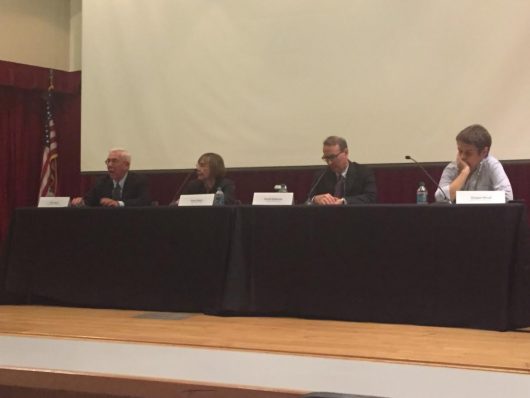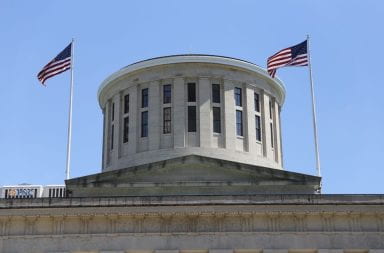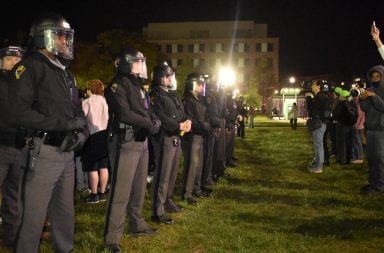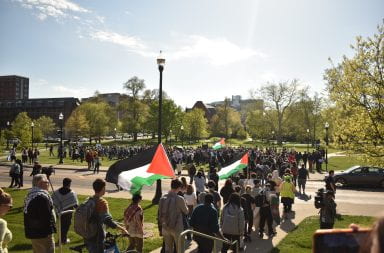
A panel discusses the role and impact of presidential debates during an event held at the Moritz College of Law on Oct. 21. Credit: Kayleen Petrovia | For The Lantern
On Thursday night, a panel of Ohio State history, legal and political science scholars discussed the issues and candidates that have made up this year’s campaign season in an event titled “A Change Election? Perspectives on the 2016 Contests.”
Presented by the College of Arts and Sciences and OSU’s Democracy Studies Program, panelists gathered in the Moritz College of Law’s Saxbe Auditorium the night after the final presidential debate to examine the campaigns of candidates Hillary Clinton and Donald Trump in comparison to those of past elections.
Thomas Wood, assistant professor of political science at OSU who also worked on presidential campaigns in 2012 and 2016, said the debates this year are having less of an impact in the race, blaming increased partisanship in society.
“We might have been seeing (the effects of debates) in the ’70s, but it’s difficult to find them now in such a polarized age,” Wood said.
David Stebenne, professor of history and law at OSU, said high levels of polarization amongst voters result in with what he calls “diversity candidates” who represent a deviation from the presidential norm of historically white, protestant males.
Trump, the Republican nominee, has proven that an individual outside of a political background can gain a major party nomination. Clinton, the Democratic nominee, on the other hand, has defied the gendered precedent of a position previously held only by men.
Stebenne emphasized the political paradigm shift towards acceptance of diversity candidates in recent history.
“When I was a kid, the idea of a woman being president was a fantasy,” Stebenne said. “The only movie I ever saw about it was about a woman running for president that ended with her quitting to go home and raise a family.”
Although voters are intrigued by less stereotypical candidates like Trump and Clinton, Paula Baker, associate professor of history, said the current election season has been marked by widespread dissatisfaction with the candidates.
“The enthusiasm of ‘Oh, I get to vote for a woman!’ isn’t really there, it’s more ‘I have to vote for one of them?’” Baker said.
Despite agreement with general displeasure regarding the presidential candidates, Evin Bachelor, a second-year law student at Moritz, voiced the importance of voting, specifically in a battleground state like Ohio.
“The candidate I voted for in the primary didn’t make it, but that seems to be the story for a significant amount of people,” Bachelor said. “A lot of us didn’t get our choice, but we’re still going to vote.”
In the midst of an election he described as dramatic and unusual, panelist Paul Beck, a professor emeritus in political science, concluded the evening with a comment defined by the same cynicism that has characterized the 2016 election.
“The last words I want to say to you are hang in there,” Beck said. “You only have 18 more days!”


